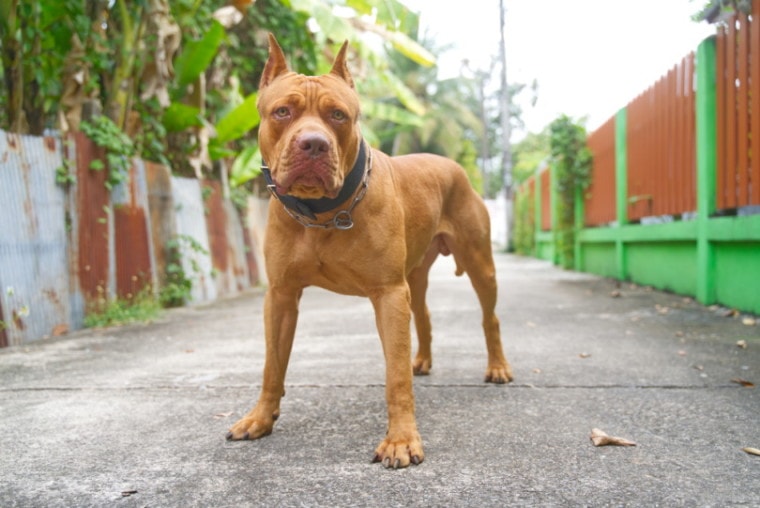
Click to Skip Ahead
Pit Bulls have had quite a bad rap over the past several years. These dogs seem to elicit fear-based thinking—as people believe they are dangerous, aggressive, and unpredictable. Since people have forced them into fighting rings, they have had quite a struggle getting back their positive image.
However, awareness of prejudice is coming to fruition for these fantastic creatures. It’s about time that the truth comes out, and the stigma against the breed ceases. Let’s find out the truth about Pit Bulls. You can click the links below to jump to the different sections of the post, or just scroll below to read the whole thing.
The 8 Myths & Misconceptions About Pit Bulls
1. Pit Bulls are inherently aggressive
Even though Pit Bulls have an incredible reputation for being extremely aggressive, that is the furthest thing from true. By nature, Pit Bulls are incredibly loyal and devoted to their owners. While they might be a little bit protective in some cases, they are highly trainable.
As a result of past abuse, or because of poor breeding lines, any dog can become aggressive. Because of the highly muscular structure of a Pit Bull, this can make them a lot more threatening. But they have no greater risk of being aggressive than any other breed if they are properly raised and socialized.

2. Pit Bulls can lock their jaws without releasing
There is a significant misconception that Pit Bulls can lock their jaws, creating an unbreakable hold. This is not true, at least, not in the way that most people think.
Pit Bulls are a very enthusiastic breed that is competitive during play. If you ever play tug-of-war with one, you will understand just how tightly they can grasp with their jaws. However, there is no special skill a Pit Bull has that makes their jaws snap shut and stay closed.
3. Pit Bulls have the strongest bite force
PSI, or pounds per square, refers to the force in which dogs bite. Even though most people think that Pit Bulls have the strongest bite force of any other canine, this is actually false.
Pit Bulls do not have the strongest bite force by far. They don’t even make the top 10 list. Other breeds that are twice as powerful include Dogo Argentino, Doggo Canario, the English Mastiff, and the Tosa Inu.
Pitbulls only have a PSI of 235, meaning the pressure pounds are minimal compared to other dog breeds.
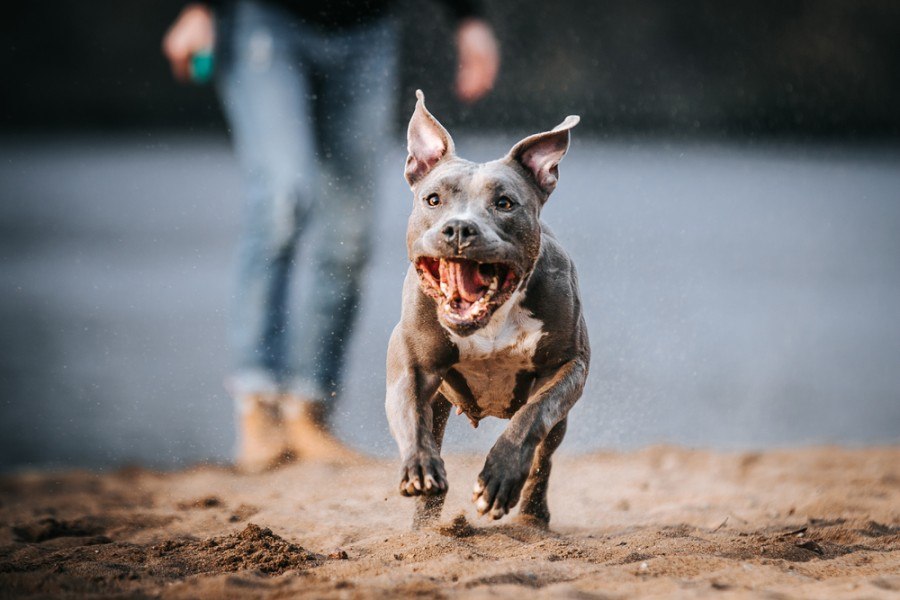
4. Pit Bulls don’t get along with other dogs
Pit Bulls are notoriously labeled as breeds that do not get along with other dogs. They are especially pegged as being terrible with same-sex aggression. While this could be the case, significantly depending on background, well-socialized Pit Bulls are no worse with other dogs and other breeds in this regard.
If your Pit Bull is raised with other dogs, they will acclimate to the environment, getting along very well with them over time. However, they are a bit territorial. So, if they feel that another canine is a threat, they might act protective of their home.
This isn’t necessarily a bad quality, and it definitely doesn’t mean that they are always going to lash out in an outward attack. Most of the time, this lovable breed will adore having a partner in crime.
5. Pit Bulls are always aggressive towards cats
Pit Bulls have quite the reputation for being predators. Many claim that they are incredibly aggressive towards cats, and are basically not good with any smaller animal. While this can be true in some cases, it is not always.
Pit Bulls love to chase and play. Because of their strong jaws, it would be pretty easy for them to hurt a smaller animal. However, this isn’t always intentional. Don’t mistake their prey drive for being malicious. It’s simply not the case. This danger exists for many dogs with high prey drives.
Pit Bulls that are raised alongside cats have almost no problem whatsoever getting along with them. However, different situations warrant different behaviors. You always have to make sure that every single animal that interacts with one another stays safe.

6. Pit Bulls can’t be trusted with kids
There is a widespread misconception that Pit Bulls are not suitable for children. This is so false, actually, that the opposite is true. When the breed first started, there was a nickname that they developed – the nanny dog.
That is because they were so loving and affectionate towards children that they were given duties to protect them. Any dog can be a danger to a child, which is why supervision is essential. However, this breed is protective, doting, and docile with children when they are raised correctly.
7. Pit Bulls are the only dogs used for fighting
When a person sees a Pit Bull, it is a common reaction to assume that they are a fighter dog. A horrible stigma comes with the breed due to what human beings have done to them. Indeed, Pit Bulls were widely used in fighting rings, but this practice has decreased drastically over the last several years.
But sadly, when it comes to fighting, like any other dog, if they are trained to act, it will comply. Pit Bulls are no different.
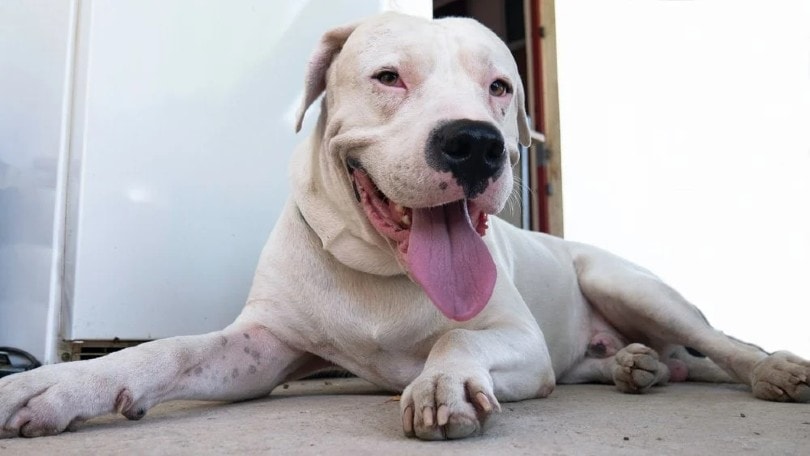
8. Pit Bulls in Shelters Shouldn’t Be Adopted
It is a fact that Pit Bulls flood rescues and shelters all over America. They are one of the most surrendered and rescued breeds of all canines. Many people think that once a Pit Bull winds up in a shelter, this makes them unadoptable.
While you should always be cautious with any dog you rescue, Pit Bulls are absolutely ready and willing to find a forever home. Naturally, some of them will have more issues than others, which is true of any breed.
Anytime you rescue a dog from a shelter, it’s best to conduct home visits or slow introductions to know that they’re compatible with your existing pets and children. This is not just true for the Pit Bull breed. You should test any dog to gauge compatibility.
The more confident you are that that dog will acclimate into your household, the less you risk any adverse reactions, including having to, unfortunately, rehome these animals.
Pit Bull Information
| Name: | American Pit Bull Terrier |
| Height: | 18-21 inches |
| Weight: | 30-65 pounds |
| Colors: | Black, white, brindle, fawn, tan, grey, blue, brown, red |
| Lifespan: | 8-15 years |
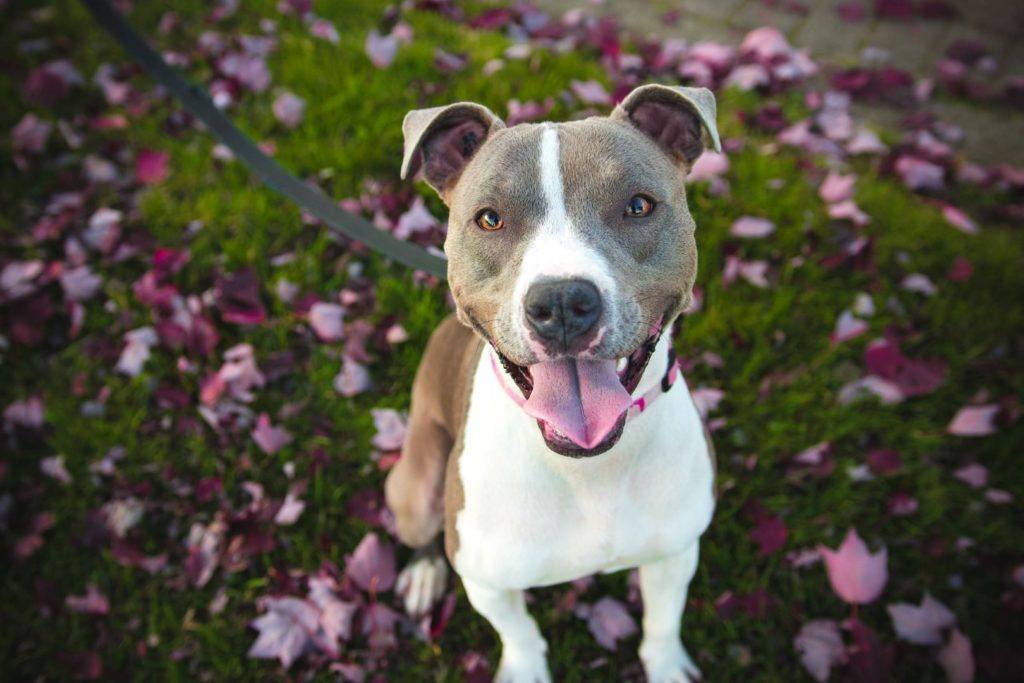
How Pit Bulls Got Their Reputation
Pit Bulls were originally bred for guarding and companionship. However, in the 1800s, things changed for this breed as gamblers began to use them for entertainment and financial gain. These people began developing fighter dogs by over breeding and culling litters to produce a hyper-aggressive temperament.
Unfortunately for the breed, human beings recognized their incredible muscle tone, definition, and willingness to follow commands. Due to their desirable traits, bad people took advantage of the breed, creating long lines of fighter dogs trained to kill.
Pit Bulls were conditioned to aggressively attack other dogs in the ring, fighting to the death. Because of this aggression, it created bad breeding bloodlines. Just like any other factors related to poor temperament, it can really put a damper on future litters, causing more behavioral problems that are tough to correct.
However, that does not mean that every Pit Bull you encounter has a fighter bloodline. It also doesn’t mean that any Pit Bull that has been abused, neglected, or otherwise mistreated has no hope for a stable future.
Pit Bulls are incredibly loving creatures that are extremely interactive and loyal to their owners. When it comes to the aggression and bad stigma related to the breed, it is 100% the fault of people who conditioned them, not the dog’s.
Pit Bulls in Shelters
Unfortunately, Pit Bulls are the most common dog in shelters and rescues all over—by a landslide. So much stigma has been built around them that many owners surrender them due to breed restrictions in apartments, communities, or other law-related factors.
Others breed Pit Bulls relentlessly, choosing methods that don’t produce quality puppies. The breeding of these animals is purely profit-based, and they are often placed in homes that don’t take the commitment seriously. Plus, dogs that come from these situations can exhibit poor temperaments or health issues.
With more awareness being brought to light, people are using this breed to create healthier, more evenly-tempered dogs—eliminating negative qualities. Animal advocates diligently work to rescue these beautiful creatures from destitute situations.
The more we can introduce potential owners to the reality of the breed, the more Pit Bulls will finally find their loving forever homes, sparing them from negative situations and shelters.
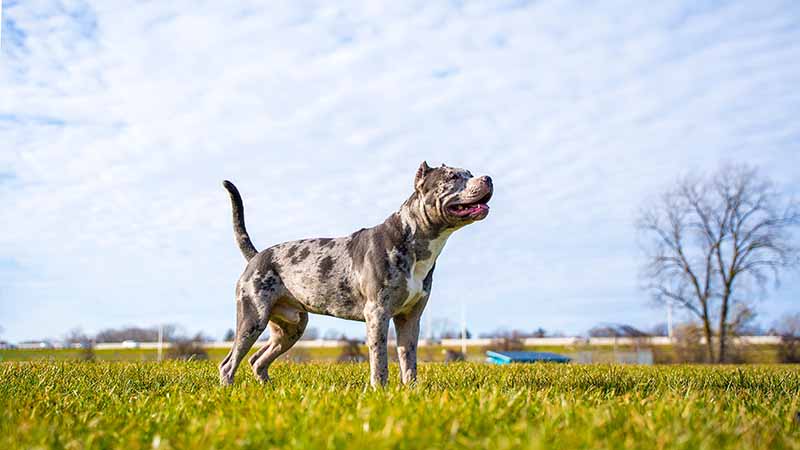
Final Thoughts
As you can see, there is nothing to fear when you have a Pit Bull. Over time, poor breeding is being eradicated to produce healthy, happy litters. And law enforcement continues to work behind the scenes, ensuring an end to dogfighting not just for Pit Bulls—but every breed.
Pit Bulls are some of the kindest, most devoted dogs you can own. As long as you select a pup or adult that fits in with your living situation, you will have a companion that will never leave your side. We deserve to bring out the facts and leave the unfortunate history where it belongs—in the past.
Related Read:
- 10 Rottweiler Myths & Misconceptions: It’s Time To Stop Believing These!
- Blue Brindle Pitbull: History, Pictures, Facts & More
Featured Image Credit: KruBeer Photo, Shutterstock







